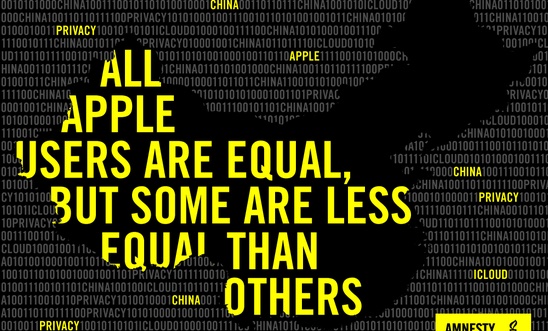Amnesty International — an organization that “works to protect women, men and children wherever justice, freedom, truth and dignity are denied” — has launched a new social media campaign targeting Apple over its “betrayal” of millions of Chinese iCloud users by “recklessly” making their personal data vulnerable to the arbitrary scrutiny of the Chinese government.
Last month, Apple transferred the operation of its iCloud service for Chinese users to Guizhou-Cloud Big Data. The move affects any photos, documents, contacts, messages and other user data and content that Chinese users store on Apple’s cloud-based servers.

In response, Amnesty’s online campaign urges consumers to tell Apple CEO Tim Cook to reject double standards when it comes to privacy for Chinese customers, whose personal data is now at risk of ending up in the hands of the government.
In a nod to Apple’s classic“1984” TV commercial, the campaign takes an Orwellian theme with the line “All Apple users are equal but some are less equal than other.”
“Tim Cook is not being upfront with Apple’s Chinese users when insisting that their private data will always be secure,” says Nicholas Bequelin, East Asia director at Amnesty International. “Apple’s pursuit of profits has left Chinese iCloud users facing huge new privacy risks. By handing over its China iCloud service to a local company without sufficient safeguards, the Chinese authorities now have potentially unfettered access to all Apple’s Chinese customers’ iCloud data. Apple knows it, yet has not warned its customers in China of the risks.”
On Feb. 1, Amnesty wrote to Apple expressing its concerns about the changes and asked the company to provide further information. Apple has yet to respond to the request.
New Chinese legislation enacted in 2017 requires cloud services to be operated by Chinese companies, meaning companies like Apple must either lease server space inside China or establish joint ventures with Chinese partners.
Bequelin says Chinese domestic law gives the government virtually unrestricted access to user data stored inside China without adequate protection for users’ rights to privacy, freedom of expression or other basic human rights. As a result, Chinese Internet users can face arrest and imprisonment for merely expressing, communicating or accessing information and ideas the authorities do not approve of, he adds.
In a statement to Reuters, Apple said it had to comply with the new Chinese laws, and ultimately decided it was better to allow local hosting of the iCloud than to discontinue the service, which it argued could lead to an even greater erosion of users’ data privacy and security.
